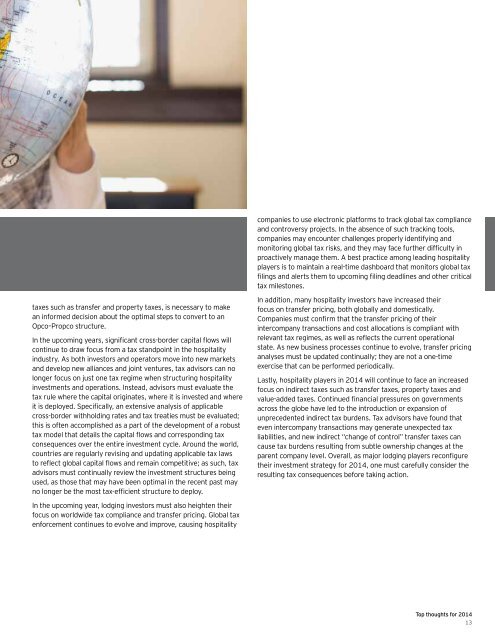0iQESq
0iQESq
0iQESq
Create successful ePaper yourself
Turn your PDF publications into a flip-book with our unique Google optimized e-Paper software.
companies to use electronic platforms to track global tax compliance<br />
and controversy projects. In the absence of such tracking tools,<br />
companies may encounter challenges properly identifying and<br />
monitoring global tax risks, and they may face further difficulty in<br />
proactively manage them. A best practice among leading hospitality<br />
players is to maintain a real-time dashboard that monitors global tax<br />
filings and alerts them to upcoming filing deadlines and other critical<br />
tax milestones.<br />
taxes such as transfer and property taxes, is necessary to make<br />
an informed decision about the optimal steps to convert to an<br />
Opco–Propco structure.<br />
In the upcoming years, significant cross-border capital flows will<br />
continue to draw focus from a tax standpoint in the hospitality<br />
industry. As both investors and operators move into new markets<br />
and develop new alliances and joint ventures, tax advisors can no<br />
longer focus on just one tax regime when structuring hospitality<br />
investments and operations. Instead, advisors must evaluate the<br />
tax rule where the capital originates, where it is invested and where<br />
it is deployed. Specifically, an extensive analysis of applicable<br />
cross-border withholding rates and tax treaties must be evaluated;<br />
this is often accomplished as a part of the development of a robust<br />
tax model that details the capital flows and corresponding tax<br />
consequences over the entire investment cycle. Around the world,<br />
countries are regularly revising and updating applicable tax laws<br />
to reflect global capital flows and remain competitive; as such, tax<br />
advisors must continually review the investment structures being<br />
used, as those that may have been optimal in the recent past may<br />
no longer be the most tax-efficient structure to deploy.<br />
In the upcoming year, lodging investors must also heighten their<br />
focus on worldwide tax compliance and transfer pricing. Global tax<br />
enforcement continues to evolve and improve, causing hospitality<br />
In addition, many hospitality investors have increased their<br />
focus on transfer pricing, both globally and domestically.<br />
Companies must confirm that the transfer pricing of their<br />
intercompany transactions and cost allocations is compliant with<br />
relevant tax regimes, as well as reflects the current operational<br />
state. As new business processes continue to evolve, transfer pricing<br />
analyses must be updated continually; they are not a one-time<br />
exercise that can be performed periodically.<br />
Lastly, hospitality players in 2014 will continue to face an increased<br />
focus on indirect taxes such as transfer taxes, property taxes and<br />
value-added taxes. Continued financial pressures on governments<br />
across the globe have led to the introduction or expansion of<br />
unprecedented indirect tax burdens. Tax advisors have found that<br />
even intercompany transactions may generate unexpected tax<br />
liabilities, and new indirect “change of control” transfer taxes can<br />
cause tax burdens resulting from subtle ownership changes at the<br />
parent company level. Overall, as major lodging players reconfigure<br />
their investment strategy for 2014, one must carefully consider the<br />
resulting tax consequences before taking action.<br />
Top thoughts for 2014<br />
13



